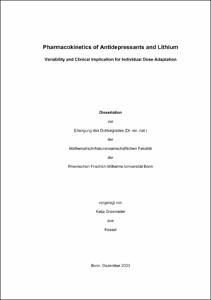Pharmacokinetics of Antidepressants and LithiumVariability and Clinical Implication for Individual Dose Adaptation

Pharmacokinetics of Antidepressants and Lithium
Variability and Clinical Implication for Individual Dose Adaptation

| dc.contributor.advisor | Rao, Marie Luise | |
| dc.contributor.author | Grasmäder, Katja | |
| dc.date.accessioned | 2020-04-06T12:33:25Z | |
| dc.date.available | 2020-04-06T12:33:25Z | |
| dc.date.issued | 2003 | |
| dc.identifier.uri | https://hdl.handle.net/20.500.11811/1957 | |
| dc.description.abstract | Depression is the most frequent mental disorder occuring in 17% of the European population and its impact is assumed to grow in the next decades. Optimal treatment necessitates long-term administration of antidepressants in unipolar depressive disorder or mood stabilisers in bipolar disorder. Therapeutic drug monitoring of these drugs aims to individually adjust the dosis regimen of a patient by measuring trough plasma concentrations. Among mood stabilisers, lithium is the standard of care and therapeutic drug monitoring of lithium is mandatory to control wide interindividual variability in serum concentrations and to prevent severe intoxication. In this thesis a computer-assisted service for dose individualisation was established that applies population pharmacokinetic and individual data to predict and simulate serum concentrations by Bayesian curve fitting. A multicentre naturalistic study was conducted to evaluate the relevance of therapeutic drug monitoring of the antidepressants amitriptyline, citalopram, clomipramine, desipramine, doxepin, fluvoxamine, imipramine, mirtazapine, nortriptyline, paroxetine, sertraline and venlafaxine. One hundred and thirty-six patients were recruited that also gave informed consent for an evaluation of the genetic factors underlying the response to antidepressive treatment. These data consisted to 93% of second generation antidepressants and were evaluated for an impact of CYP2C9, CYP2C19 and CYP2D6 polymorphisms on trough plasma concentrations, side effects and treatment response. It was demonstrated that CYP2D6 plays a significant role in the treatment with second generation antidepressants. The analysis also confirmed an impact of the CYP2C19 genotype or smoking on dose corrected trough plasma concentrations. Providing a basis for therapeutic drug monitoring of mirtazapine, patients that received this antidepressant were analysed separately for a concentration-effect relationship and to determine factors influencing its pharmacokinetics. These findings indicate that therapeutic drug monitoring of mirtazapine may be beneficial in nonresponders with plasma concentrations below 30 ng/mL. Dose adaption may be considered in patients with decreased CYP2D6 activity. | en |
| dc.language.iso | eng | |
| dc.rights | In Copyright | |
| dc.rights.uri | http://rightsstatements.org/vocab/InC/1.0/ | |
| dc.subject | Antidepressiva | |
| dc.subject | Lithium | |
| dc.subject | Therapeutisches Drug Monitoring | |
| dc.subject | Pharmakokinetik | |
| dc.subject | Pharmakogenetik | |
| dc.subject.ddc | 610 Medizin, Gesundheit | |
| dc.title | Pharmacokinetics of Antidepressants and Lithium | |
| dc.title.alternative | Variability and Clinical Implication for Individual Dose Adaptation | |
| dc.type | Dissertation oder Habilitation | |
| dc.publisher.name | Universitäts- und Landesbibliothek Bonn | |
| dc.publisher.location | Bonn | |
| dc.rights.accessRights | openAccess | |
| dc.identifier.urn | https://nbn-resolving.org/urn:nbn:de:hbz:5n-03028 | |
| ulbbn.pubtype | Erstveröffentlichung | |
| ulbbnediss.affiliation.name | Rheinische Friedrich-Wilhelms-Universität Bonn | |
| ulbbnediss.affiliation.location | Bonn | |
| ulbbnediss.thesis.level | Dissertation | |
| ulbbnediss.dissID | 302 | |
| ulbbnediss.date.accepted | 18.12.2003 | |
| ulbbnediss.fakultaet | Mathematisch-Naturwissenschaftliche Fakultät | |
| dc.contributor.coReferee | Jaehde, Ulrich |
Files in this item
This item appears in the following Collection(s)
-
E-Dissertationen (4466)




